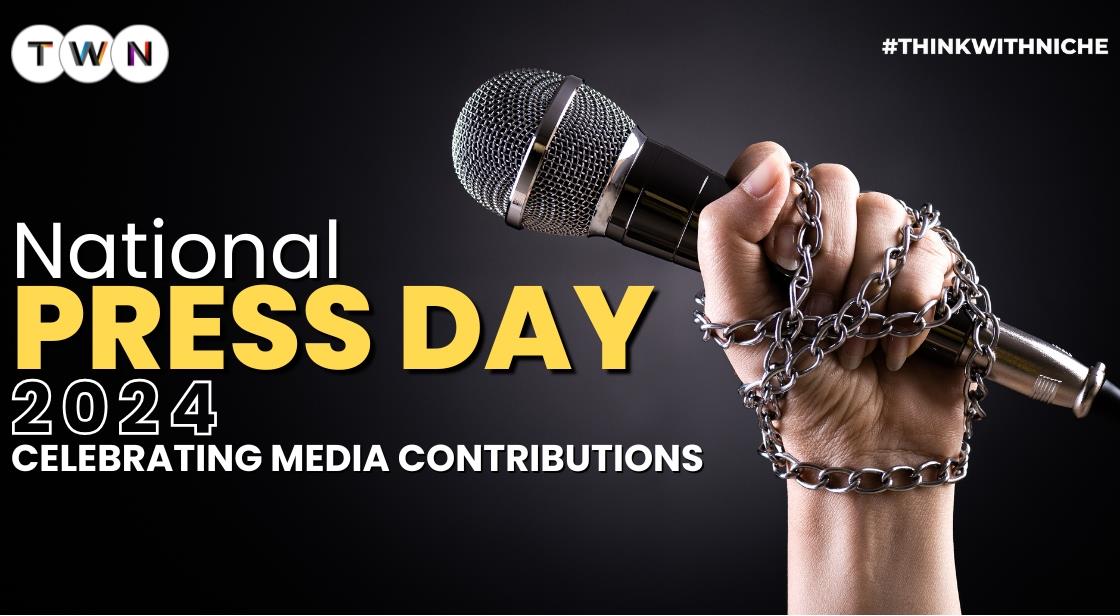National Press Day 2024 Celebrating Media Contributions

Blog Post
National Press Day, celebrated annually on November 16, marks the establishment of the Press Council of India (PCI) in 1966 and serves as a tribute to journalism’s role in democracy.
This day honors the contributions of the media in informing the public, shaping national discourse, and holding the powerful accountable. Journalism, often called the "fourth pillar of democracy," is essential for transparency, accountability, and public empowerment.
In 2024, as we celebrate National Press Day, the media landscape continues to evolve rapidly. The transition from traditional print and broadcast media to digital platforms and citizen journalism has introduced new opportunities and challenges.
The role of the Press Council of India remains as vital as ever, especially in promoting ethical journalism and upholding press freedom amidst rising concerns over misinformation and media integrity.
This blog explores the significant role of the media in Indian democracy, the evolution of journalism in the country, and how journalists continue to drive social change, even under challenging conditions.
The post also highlights the importance of acknowledging journalists' sacrifices and celebrating their unwavering dedication to the pursuit of truth.
National Press Day 2024 and the Future of Journalism
National Press Day is celebrated every year on November 16 in India to mark the establishment of the Press Council of India (PCI) in 1966. The Press Council was formed to regulate and maintain the ethical standards of journalism, ensuring the free and fair dissemination of information. The day serves as a tribute to the contributions of the media in shaping public discourse, providing a platform for diverse voices, and holding the powerful accountable.
Significance of National Press Day
The occasion is an important reminder of the crucial role that the media plays in any democratic society. It recognizes the media’s ability to inform, educate, and influence public opinion. By offering news and information, the media empowers citizens to make informed decisions about their lives, government, and society.
National Press Day emphasizes the media's role in upholding transparency, ensuring that the actions of both public officials and private organizations are scrutinized for the benefit of society at large.
Moreover, the day underscores the necessity of freedom of the press in a democracy. By protecting journalists and news outlets from censorship and oppression, National Press Day promotes the foundational principle that media must remain free from political or corporate influence to fulfill its responsibilities effectively.
Media in the Digital Age – 2024 Celebration
As we celebrate National Press Day 2024, it is essential to acknowledge how rapidly the media landscape has transformed. From traditional print and broadcast to the rise of digital platforms, the media has adapted to an ever-changing technological environment. The rise of social media, citizen journalism, and digital news has brought both opportunities and challenges for journalists.
The event in 2024 emphasizes the need for responsible, ethical reporting in the face of misinformation, and the media’s ongoing role in protecting the values of democracy.
1. The Role of Media as the Fourth Pillar of Democracy
Ensuring Accountability, Justice, and Transparency
In a democratic society, the media acts as the fourth pillar of democracy, standing alongside the executive, legislature, and judiciary. It plays a crucial role in ensuring accountability by exposing corruption, mismanagement, and injustices within the government and institutions.
Through investigative journalism and unbiased reporting, the media holds public officials and organizations accountable, making sure they serve the public interest. This transparency fosters trust in democratic institutions and encourages responsible governance.
Educating and Informing the Public
The press serves as a vital tool for educating and informing citizens on a variety of social, political, and economic issues. Informed citizens are better equipped to make decisions about their government, their rights, and their societal roles.
Media outlets provide essential information on policies, laws, and developments that directly affect daily life, ensuring that people are aware of important issues such as healthcare, education, employment, and justice. Without an informed populace, democracy cannot function effectively.
Impact on Public Policy and Social Reforms
Throughout history, the media has had a profound impact on shaping public policy and driving social reforms. Notable instances include the role of media in the Indian independence movement, where it helped mobilize masses against British rule.
More recently, media coverage has been pivotal in social movements like the Right to Information Act, gender equality campaigns, and the fight against corruption. Through exposing societal issues, the media has sparked important debates and influenced reforms that promote social justice and equality.
Also Read: Celebrating World Hindi Day 2024: 5 Authors Who Shaped Hindi Literature
2. The Evolution of Media in India
Early Media in India – Print and Radio
Media in India began with print newspapers, with the first newspaper, The Bengal Gazette, published in 1780. The print industry grew gradually, with many regional and national newspapers playing a pivotal role in India's independence movement. Following print, radio emerged as a key medium for information. The All India Radio (AIR), established in 1936, became the primary source of news for millions of Indians, especially during the post-independence era.
The Advent of Television and TV News
The next major milestone in Indian media history was the introduction of television. The Indian government launched Doordarshan (DD) in 1959, initially as a government-run network. However, it wasn’t until the 1980s that TV news became widely popular, with key events like the 1984 anti-Sikh riots and the 1991 economic reforms being broadcast live, changing the way people consumed news.
The Liberalization of Media
The 1990s brought significant changes with India’s economic liberalization, which opened up the media industry to private players. The satellite television boom in the 1990s led to the rise of private news channels like Zee News, NDTV, and CNN-IBN, breaking the government monopoly and diversifying content for Indian viewers.
The Digital Revolution and Challenges
In the 21st century, the digital revolution transformed the media landscape. The rise of the internet and social media has changed the way news is consumed, offering both opportunities and challenges. While the internet has democratized information, the spread of misinformation and fake news remains a major challenge. Government regulation, digital transformation, and the struggle for ethical journalism are the ongoing challenges for the industry.
3. The Press Council of India and Its Role
Establishment and Purpose of the Press Council of India (PCI)
The Press Council of India (PCI) was established in 1966 with the objective of preserving the freedom of the press in India. It serves as an autonomous body that aims to maintain the standards of journalism and ensure that the media operates ethically and responsibly. The Council was set up in response to concerns about the increasing commercialization of media and the potential for bias, misinformation, and unethical practices in journalism.
Functions of the Press Council of India
One of the primary functions of the PCI is to regulate the ethical standards of journalism. It does this by formulating guidelines and code of conduct for journalists and media organizations, promoting accuracy, fairness, and responsibility in news reporting. The council also addresses complaints from the public regarding violations of these standards, investigating matters related to defamation, sensationalism, and inaccuracies in reporting.
Additionally, the PCI works to uphold the independence of the press, ensuring that media outlets are free from political or commercial interference. It plays a crucial role in defending press freedom and advocating for the rights of journalists.
Fostering Responsible Journalism Today
In the current media landscape, where digital platforms are gaining prominence, the PCI’s role is even more vital. The rise of social media and digital news has led to new challenges such as fake news, online harassment, and ethical concerns. The PCI’s continued focus on promoting responsible journalism is crucial in maintaining the integrity of the media and ensuring that it remains a trustworthy source of information for the public.
4. The Changing Media Landscape in 2024
The Changing Media Landscape in 2024 Discuss the rapid changes in the media sector, particularly the rise of digital news platforms, social media, and citizen journalism. Explore the challenges faced by traditional media outlets in maintaining readership and credibility amidst increasing digital content consumption. Highlight how the media is adapting to new technologies like artificial intelligence, data journalism, and multimedia storytelling.
The media landscape in 2024 is undergoing rapid transformation, driven by the rise of digital news platforms, social media, and citizen journalism. Here's a closer look at these changes and the challenges faced by traditional media outlets:
Rise of Digital News Platforms and Social Media
Digital news platforms have revolutionized how news is consumed. With the advent of websites, social media, and mobile apps, news is now accessible at unprecedented speed and scale. Platforms like TikTok, Instagram Reels, and YouTube Shorts have become popular sources for news, especially among younger audiences. These platforms offer bite-sized, engaging content that caters to the fast-paced consumption habits of today's digital natives.
Citizen Journalism
Citizen journalism has emerged as a powerful force, allowing ordinary individuals to capture and share news events in real-time. With smartphones and internet access, anyone can report on events, providing alternative perspectives and challenging mainstream narratives. This democratization of journalism has increased audience engagement and diversified the range of voices in the media landscape.
Challenges Faced by Traditional Media Outlets
Traditional media outlets are facing significant challenges in maintaining readership and credibility. The rise of misinformation and disinformation on social media platforms has eroded public trust in news sources. Additionally, declining advertising revenues and the shift of audiences to digital platforms have put financial pressure on traditional media. These outlets must now compete with a plethora of free, easily accessible content, making it harder to sustain their business models.
Adapting to New Technologies
To stay relevant, traditional media outlets are embracing new technologies like artificial intelligence (AI), data journalism, and multimedia storytelling. AI-driven tools are being used to personalize content, automate news production, and enhance audience engagement. Data journalism allows for in-depth, data-driven stories that provide deeper insights into complex issues. Multimedia storytelling combines text, images, videos, and interactive elements to create a more immersive and engaging news experience.
5. Media and Its Impact on Social Change
Media has indeed played a crucial role in driving social change across various domains. Here are some examples of how media has influenced social movements and the power of investigative journalism in India:
Social Movements
-
Women's Rights: The 2012 Nirbhaya case, involving the horrific gangrape of a young woman in Delhi, received widespread media attention. The persistent coverage by media outlets sparked public outrage and led to the Criminal Law (Amendment) Act, 2013, also known as the Nirbhaya Act, which recognized gender-based crimes and increased the punishment for aggravated rape and assault.
-
Environmental Awareness: The Chipko Movement in the 1970s, where villagers in Uttarakhand hugged trees to prevent deforestation, gained national and international media attention. This movement led to a ban on tree felling in the Himalayan regions.
-
Equal Rights: The Dalit Panther Movement in the 1970s, which aimed to fight caste-based discrimination, was widely covered by the media, bringing attention to the plight of Dalits and pushing for social reforms.
Investigative Journalism
-
Exposing Corruption: Investigative journalists have played a pivotal role in exposing corruption. For instance, the Reporters Collective revealed an Orwellian plan by the Indian government to track all citizens through a comprehensive database under the guise of monitoring welfare programs.
-
Human Rights Violations: The Wire uncovered the involvement of certain individuals in spreading hate and instigating violence during the Delhi riots, highlighting the failure of the police to conduct a proper investigation.
-
Social Injustices: Investigative stories have also brought to light social injustices, such as the missing trees and climate change promises investigation by Scroll.in, which revealed that some of the supposed plantations under the afforestation program did not exist.
Who are the best Indian journalists?
Prannoy Roy
Introduction of Prannoy Roy:
Prannoy Roy is a renowned British Chartered Accountant and Economist, celebrated for his significant contributions to Indian journalism. He is the co-founder of NDTV, a pioneering news channel he established with his wife, Radhika Roy, who also serves as the co-chairperson. Additionally, Roy has co-authored two books alongside David Butler, further showcasing his versatility and expertise.
Awards & Achievements of Prannoy Roy:
-
Leverhulme Trust (UK) Fellowship
-
Mary College Prize
-
OPOS Scholarship at The Doon School
-
Chartered Accountancy, ICA England & Wales
Barkha Dutt
Introduction of Barkha Dutt:
Barkha Dutt rose to prominence in Indian journalism with her exceptional frontline coverage during the 1999 Kargil War. She became a household name through her widely acclaimed news shows, We the People and The Buck Stops Here. Despite facing criticism for some of her reporting, she remains one of India’s most influential and inspiring journalists.
Awards & Achievements of Barkha Dutt:
-
Padma Shri
-
C H Mohammed Koya National Journalism Award
-
Indian News Broadcasting Award
-
Commonwealth Broadcasting Association Award
Gauri Lankesh
Introduction of Gauri Lankesh:
Gauri Lankesh was a fearless journalist and activist known for her strong criticism of right-wing Hindutva politics. She served as the editor of Lankesh Patrike, a Kannada daily founded by her father, and also published her own weekly, Gauri Lankesh Patrike. Her bold stance on societal issues led to her tragic assassination outside her home in Bangalore on September 5, 2017. Her contributions to journalism and social justice remain invaluable and enduring.
Awards & Achievements of Gauri Lankesh:
Her relentless commitment to improving Indian society and politics was both her greatest achievement and enduring legacy.
Rajat Sharma
Introduction of Rajat Sharma:
Rajat Sharma is best known as the host of Aap Ki Adalat, one of India’s most engaging and controversial talk shows. He is the Chairman and Editor-in-Chief of India TV, which airs the program. Sharma is widely regarded as one of India’s leading journalists, having received numerous accolades for his contributions to the field.
Awards & Achievements of Rajat Sharma:
-
Tarun Kranti Award
-
Padma Bhushan
-
Ranked No. 33 in India’s 50 Most Powerful People (2017)
Ravish Kumar
Introduction of Ravish Kumar:
Ravish Kumar is an acclaimed journalist, anchor, and writer known for his insightful coverage of Indian politics and social issues. As the Senior Executive Editor of NDTV India, he hosts the channel’s prime-time shows and has earned widespread recognition for his impactful journalism.
Awards & Achievements of Ravish Kumar:
-
Ganesh Shankar Vidyarthi Award
-
Ramnath Goenka Excellence in Journalism Award
-
Kuldip Nayar Journalism Award
Rajdeep Sardesai
Rajdeep Sardesai is a distinguished journalist and news anchor known for his unwavering support for press freedom. With an illustrious career spanning decades, he has extensively covered significant social issues, often shedding light on topics of national importance. Sardesai's in-depth reporting and ability to engage with complex matters have earned him recognition as a leading voice in Indian journalism.
Nidhi Razdan
Nidhi Razdan is an award-winning journalist celebrated for her impactful reporting on human rights violations and social injustices. Through her work, she has brought critical issues to the forefront, fostering awareness and sparking dialogue on topics that demand attention. Razdan's dedication to addressing societal challenges and her fearless approach to journalism have made her a respected figure in the field
Media's role in shaping public opinion and mobilizing action cannot be overstated. It continues to be a powerful tool for social change, holding those in power accountable and giving a voice to the marginalized.
6. Celebrating the Contributions of Journalists
Journalists play an indispensable role in society, often putting themselves at great risk to uncover the truth and hold those in power accountable. Their dedication and courage deserve immense recognition, especially when they face adversity such as threats, violence, and censorship.
Hard Work and Sacrifices
Journalists frequently work under difficult and dangerous conditions to bring vital information to the public. They often face:
-
Threats: Journalists like Gauri Lankesh in India have faced threats to their lives for their fearless reporting.
-
Violence: Many journalists have been attacked or even killed for their work, highlighting the extreme dangers they face.
-
Censorship: Governments and other powerful entities sometimes attempt to censor journalists, hindering their ability to report freely and truthfully.
Honoring Dedication and Contributions
On National Press Day and beyond, we should acknowledge and celebrate the dedication of journalists who:
-
Seek the Truth: Relentlessly pursue the truth and provide accurate information to the public.
-
Raise Awareness: Highlight important social issues, such as human rights violations, environmental concerns, and social injustices.
-
Facilitate Change: Inspire action and change through their reporting, empowering citizens and influencing policy.
Journalists' contributions to society are invaluable, and their work continues to be essential for democracy and justice.
Conclusion
National Press Day 2024 celebrates the indispensable role of journalism in shaping democracy, promoting transparency, and driving social change. As media continues to evolve, the commitment to responsible, ethical reporting remains crucial for upholding press freedom, fostering informed citizenship, and ensuring accountability in our society.
Note - To read this article in Hindi please click on this link - राष्ट्रीय प्रेस दिवस 2024: मीडिया की समाज में भूमिका और महत्व
You May Like
EDITOR’S CHOICE












